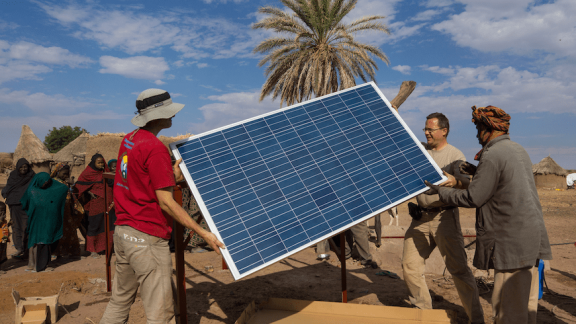FP148
Participation in Energy Access Relief Facility ("EARF")
Participation in Energy Access Relief Facility ("EARF")
Sub-Saharan Africa faces unique and acute challenges in the global fight to mitigate and adapt to climate change. On one front, the impacts of climate change are predicted to be more severe. At the same time, 548 million people in sub-Saharan Africa do not have access to electricity and instead have to rely on kerosene and diesel generators for lighting, while another 900 million (85% of the population) lack access to clean cooking fuels and technologies, causing rapid deforestation. In this context, energy access companies in the region are playing a major role in providing clean energy access to vulnerable people, but they now find their continued existence in peril due to the economic effects of the ongoing COVID-19 pandemic.
As the energy access sector has matured and scaled up over the years, it has shifted the development pathway of Africa towards a renewable future. This has entailed replacing gas generators with powerful solar home systems, fuelwood stoves with electric pressure cookers, and diesel water pumps with solar-powered irrigation.
The Energy Access Relief Facility (“EARF”) is a concessional debt fund that is intended to provide energy access companies with vital liquidity during this crisis, in the form of low-interest, unsecured junior loans. GCF will channel its investment into Climate CV, which, in turn, will participate in EARF loans to eligible companies operating in NOL countries. The aim of these loans is to help companies remain solvent, maintain staff and supply lines, be positioned to drive the post-COVID-19 recovery, and reduce 1.3 million tonnes of carbon dioxide equivalent (MtCO₂eq) in emissions.
Project timeline
Pipeline
10 Jul 2020 • 127 days
Funding proposal received
10 Jul 2020
Legal opinion on AE's Internal Approval
31 Aug 2020
Cleared by GCF Secretariat
25 Sep 2020
Cleared by iTAP
19 Oct 2020
Approved
13 Nov 2020 • 357 days
Approved by GCF Board
13 Nov 2020
FAA executed
09 Jul 2021
Under implementation
04 Nov 2021 • 1,577 days so far
FAA effective
04 Nov 2021
Disbursement - USD 20,000,000
28 Feb 2022
Disbursement - USD 9,672,000
13 Dec 2022
To be completed
03 May 2028 • 796 days to go
One region
- Africa
Nine countries
- Uganda
- Nigeria
- Democratic Republic of the Congo (the)
- Kenya
- Senegal
- Mozambique
- Sierra Leone
- Rwanda
- Zambia
Two priority groups
- Least Developed Countries
- African States
-
Financing
- Private sector
- Public sector
-
Size
- Micro
- Small
- Medium
- Large
GCF financing99% disbursed
| Instrument | Amount |
|---|---|
| Equity | USD 30,000,000 |
| Total GCF Financing |
|---|
| USD 30,000,000 |
Co-financing
| Co-financer | Instrument | Amount |
|---|---|---|
| Co-Financing | Loan | USD 13,150,000 |
| Co-Financing | Grant | USD 3,700,000 |
| Co-Financing | Loan | USD 13,150,000 |
| Total Co-Financing |
|---|
| USD 30,000,000 |
GCF Contacts
Press enquiries & interview requests
GCF CommunicationsSend e-mail
Request for information
GCF Information DisclosureRequest information about this project
Project complaints and grievances
GCF Independent Redress Mechanism (IRM)Phone +82 32 458 6186 (KST)
File a complaint
Integrity issues
GCF Independent Integrity Unity (IIU)Phone +82 32 458 6714 (KST)
Send e-mail
Entity
More contacts
National Designated Authority
Ministry of Finance, Planning and Economic Development
Permanent Secretary / Secretary to the Treasury
Ag. Director Debt and Cash Policy
Ag. Commissioner, Development Assistance and Regional Cooperation Department
Head, Climate Finance Unit
National Council on Climate Change Secretariat
Director General
14 Vistula Close, Maitama, FCT, Abuja, Nigeria
National Coordination of the Green Climate Fund
National Coordinator and GCF Focal Point for the Democratric Republic of the Congo
The National Treasury
Principal Secretary
Treasury Building 12th Floor, Harambee Avenue, Nairobi, Kenya
Programme Manager, National Coordination (FLLoCA)
Senior Policy Advisor, Climate Finance
Ministry of Environment and Sustainable Development
Head of Climate Change Division
Parc Forestier de Hann, B.P. 4055 Dakar, Senegal, Dakar, Senegal
Ministry of Planning and Development – National Directorate of Climate Finance
National Director, National Directorate of Climate Finance - Ministry of Planning and Development
Environment Protection Agency
Executive Chairman
38 Freetown Road, Freetown, Sierra Leone
Chief Director
38 Freetown Road, Freetown, Sierra Leone
Rwanda Environment Management Authority
Acting Climate Finance Specialist, REMA
Rwanda Environment Management Authority (REMA) RDB New Building, KG 9 Ave, Kigali P.O. Box 7436, Kigali, Rwanda
Ministry of Green Economy and Environment
National Coordinator
Environmental Specialist Readiness Support
Documents
| Title | Type | Date |
|---|---|---|
| 2023 Annual Performance Report for FP148: Participation in Energy Access Relief Facility ("EARF") | Annual Performance Report | 03 Dec 2024 |
| Participation in Energy Access Relief Facility ("EARF") | Approved funding proposal | 09 Dec 2020 |
| Gender action plan for FP148: Participation in Energy Access Relief Facility ("EARF") | Gender action plan | 19 Nov 2020 |
| Gender assessment for FP148: Participation in Energy Access Relief Facility ("EARF") | Gender assessment | 19 Nov 2020 |
News + Stories

GCF boosts COVID-19 low-carbon energy relief with anchor investment
01 Sep 2021 / Green Climate Fund (GCF) backing has been crucial in an emergency relief fund launched today that shields clean energy companies in developing countries from COVID-19 economic shocks to keep low-carbon trajectories on track. The USD 80 million Energy Access Relief Fund (EARF) has drawn together a unique coalition of financial support for 90 companies in Africa and Asia that have been filling energy access gaps with low-carbon solutions but now face bankruptcy form the COIVD-19 fallout. EARF will keep these companies financially solvent by providing them with short-term loans.

